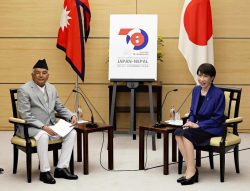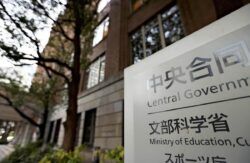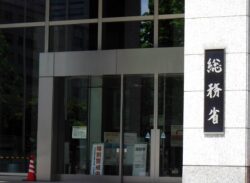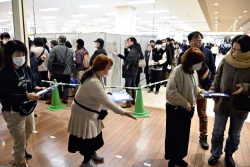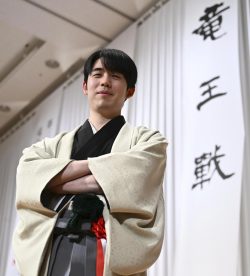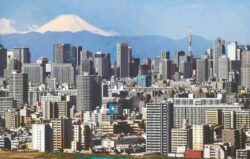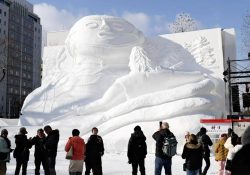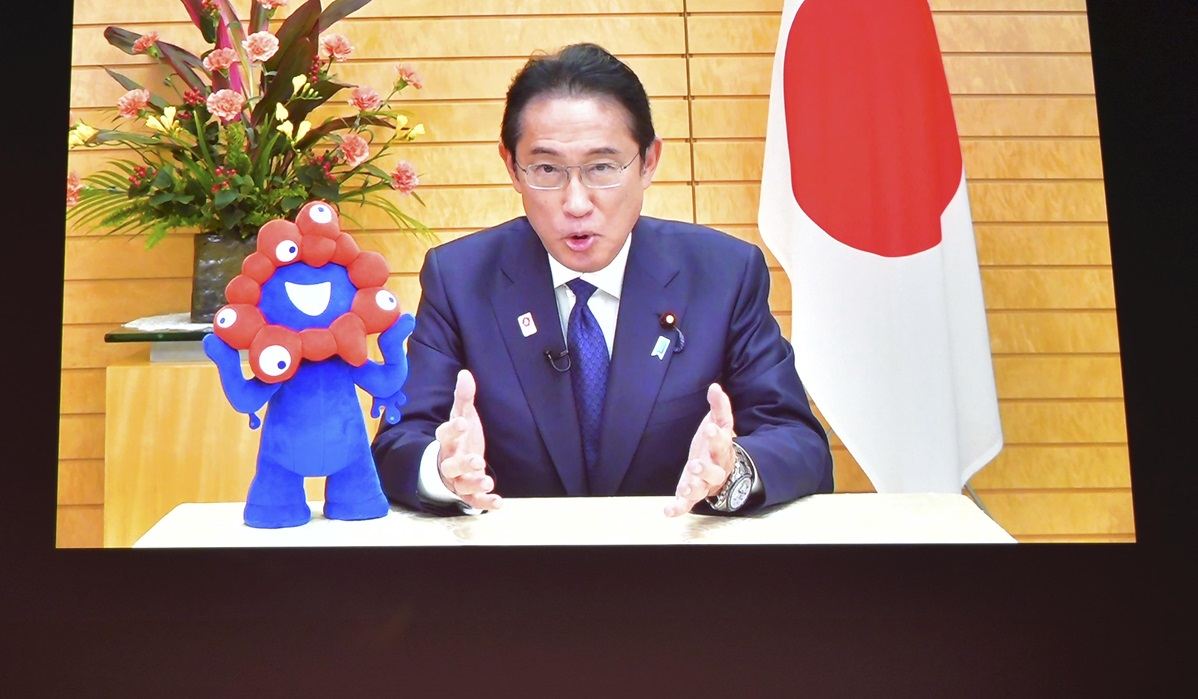
Prime Minister Fumio Kishida speaks in a video message broadcast at an event in Minato Ward, Tokyo, on Thursday to mark 500 days until the 2025 Osaka-Kansai Expo.
7:00 JST, December 2, 2023
Tickets for the 2025 Osaka-Kansai Expo went on sale Thursday, marking 500 days until the event kicks off. However, snowballing construction costs and delays to building overseas participants’ pavilions have cast a shadow over the Expo and raised concerns about how ticket sales will fare.
Prime Minister Fumio Kishida lent his weight to a campaign promoting advance tickets sales on Thursday evening. In a video message broadcast at an event in the Toranomon Hills building complex in Minato Ward, Tokyo, to mark the 500-day milestone, Kishida said the government would work as one to “build momentum” and push along preparations for the Expo. “Together, let’s make an expo that will open up the future,” Kishida said.
The Japan Association for the 2025 World Exposition, the event’s organizer, aims to sell 23 million tickets. Of these, the association hopes 14 million, or about 60%, will be advance tickets. This figure would be about 80% more than the 8 million advance tickets that the 2005 World Exposition Aichi set as its target. Ticket revenue is projected to cover most of the Expo’s operating expenses, which will top ¥80 billion.
However, rocky progress on Expo preparations has led to stinging criticism.
Venue construction costs will be shared equally by the central government, the Osaka prefectural and municipal governments, and business circles. On Nov. 2, the projection for the maximum construction cost was raised to ¥235 billion — more than 90% higher than the initial estimate — due to surging material prices, among other reasons. This was the second time the total cost had been bumped up.
Kiyomi Tsujimoto, a House of Councillors member from the opposition Constitutional Democratic Party of Japan, blasted the latest increase during a meeting of the upper house’s Budget Committee on Monday. “The estimates have been exposed as overly optimistic, and now the public is being left to pick up the bill,” Tsujimoto said. Kishida offered little defense, but insisted that the government would continue efforts to “streamline” costs.
According to a nationwide survey conducted by The Yomiuri Shimbun from Nov. 17 to 19, about 70% of respondents said they were “dissatisfied” with the large spike in Expo construction costs. Construction of pavilions for overseas participants has run into major delays, and it’s predicted that some nations’ facilities might not be completed before the Expo opens.
Association’s claims parroted
Behind the turmoil lies the impotence and dysfunction of the organizing association. The central, Osaka prefectural and Osaka municipal governments have also failed to lead, leaving no clear coordinator.
Construction material prices have spiked over the past two years. Although concerns were repeatedly raised over these rising costs, the government echoed the association’s line that these expenses “would fall within the range” set out in the Expo plan. Osaka Gov. Hirofumi Yoshimura, who is an executive board member of the association, and other officials did not raise any pointed questions about this during the association’s meetings, which are held four times a year. The central government demanded the association closely examine the amounts needed for construction only after Kishida announced a government-led initiative to accelerate Expo preparations on Aug. 31.
There also has been muttering about the performance of the association’s chairperson, Masakazu Tokura, who is head of Keidanren (Japan Business Federation) and chairman of Sumitomo Chemical Co. “We haven’t seen much initiative from him at the association,” a business world insider grumbled to The Yomiuri Shimbun.
The organizing association for the Aichi expo was headed by Shoichiro Toyoda, who was chairman of Toyota Motor Corp., the auto giant based in the prefecture. Toyoda led promotion of the expo by prodding businesses into buying advance tickets.
“When Mr. Toyoda said, ‘Let’s do it like this,’ everything fell into place,” recalled Toshio Nakamura, who was secretary general of the association.
Some observers also have noted that the estranged relationship between the central and local governments has hindered Expo preparations. Osaka’s governor and mayor are both from Nippon Ishin (Japan Innovation Party), an opposition party often at loggerheads with the ruling Liberal Democratic Party.
Ishin founders Toru Hashimoto and Ichiro Matsui pushed for Osaka to host the Expo. Both men had good relationships with then Prime Minister Shinzo Abe and then Chief Cabinet Secretary Yoshihide Suga, and secured their support to make Osaka’s bid a reality. However, Hashimoto and Matsui have both stepped away from politics. Gov. Yoshimura has no close ties to Kishida. On May 29, when Yoshimura requested the government lend a hand to overcome delays in preparing the pavilions, arranging an appointment to speak with Kishida reportedly took considerable time.
“If a problem had occurred while Mr. Matsui had been around, he would’ve quickly phoned Mr. Suga and they could probably have resolved it,” a senior Osaka prefectural government official said.
Kishida has kick-started efforts to get the association back on track, such as by dispatching senior officials from the Finance Ministry. Kishida’s expertise as a leader on this issue will be tested in the months ahead.
Covering losses
If ticket sales flop and the Expo slips into the red, it is expected that the central government and local authorities will cover this loss and the amount of public funds spent on the Expo will grow.
The 2000 expo held in Hanover, Germany, attracted about 18.1 million visitors, less than half of what was expected, and generated a loss of about ¥120 billion. The central government and local municipalities were saddled with the loss after the expo finished.
In April 2017, the Japanese government submitted its bid to host an expo in Osaka after gaining Cabinet approval, on the basis that operating expenses would not be covered by state coffers.
“If advance ticket sales go poorly, the government will instruct organizers to avoid going into the red by such measures as reducing the scale of the event and seeking sponsorship money,” a government source said.
Tokyo Skytree lights up, marking 500 days until the Osaka-Kansai Expo kicks off
Top Articles in Politics
-

Japan Tourism Agency Calls for Strengthening Measures Against Overtourism
-

Japan Seeks to Enhance Defense Capabilities in Pacific as 3 National Security Documents to Be Revised
-
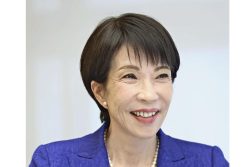
Japan’s Prime Minister: 2-Year Tax Cut on Food Possible Without Issuing Bonds
-
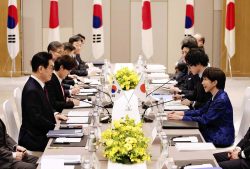
Japan-South Korea Leaders Meeting Focuses on Rare Earth Supply Chains, Cooperation Toward Regional Stability
-

Japanese Government Plans New License System Specific to VTOL Drones; Hopes to Encourage Proliferation through Relaxed Operating Requirements
JN ACCESS RANKING
-

Univ. in Japan, Tokyo-Based Startup to Develop Satellite for Disaster Prevention Measures, Bears
-

JAL, ANA Cancel Flights During 3-day Holiday Weekend due to Blizzard
-

China Confirmed to Be Operating Drilling Vessel Near Japan-China Median Line
-

China Eyes Rare Earth Foothold in Malaysia to Maintain Dominance, Counter Japan, U.S.
-

Japan Institute to Use Domestic Commercial Optical Lattice Clock to Set Japan Standard Time


